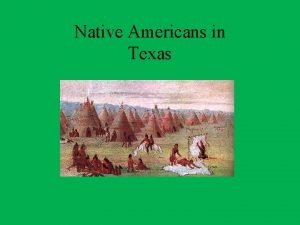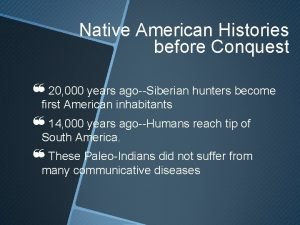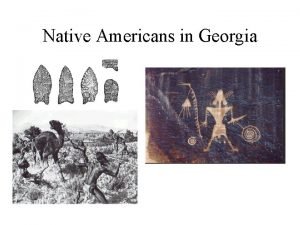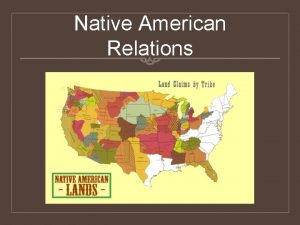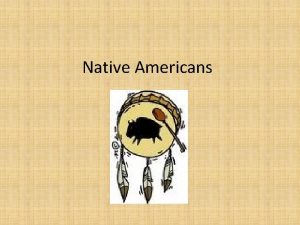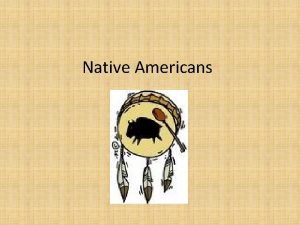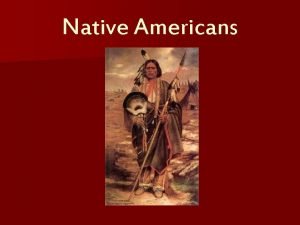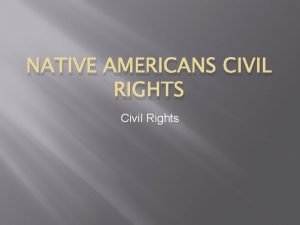CIVIL RIGHTS Native American Rights 1924 Native Americans






- Slides: 6

CIVIL RIGHTS

Native American Rights • 1924 – Native Americans are granted citizenship • 1934 – Wheeler Howard Act (Indian New Deal) – allows tribes to organize their own self governments • 1950 s – US government dissolves over 100 tribes; thousands of Indians moved to cities • 1968 – American Indian Movement (AIM) founded; believe that direct confrontation with the federal government is the way to secure Native American rights* • 1973 – AIM occupies Wounded Knee for 71 days; only surrender to federal government with the agreement to investigate their grievances* • 1975 - Indian Self Determination Act – grants greater self control and government powers to Native American Indian tribes • 1978 – Longest Walk Protest – AIM protestors walk from San Francisco to Washington, DC to protest threats to tribal sovereignty

LGBT • 1969 – Stonewall Inn Riots* • 1973 – American Psychiatric Association (APA) removes homosexuality from its official list of mental disorders • 1977 – Harvey Milk wins a seat on the San Francisco Board of Supervisors (first openly gay elected official in US) • 1980 – At the Democratic National Convention the party adds to its platform “All groups must be protected from discrimination on the basis of race, color, religion, national origin, language, sex or sexual orientation. ” • 1986 – Bowers v. Hardwick – Supreme Court rules that state laws outlawing gay sex are constitutional (5 -4) • 1993 – President Clinton institutes “Don’ Ask, Don’t Tell” policy for US military • 2003 – Vermont recognizes civil unions between gay or lesbian couples • 2003 – Lawrence v. Texas – Supreme Courts that state laws outlawing gay sex are unconstitutional (6 -3) • 2004 – Massachusetts recognizes marriage between gay or lesbian couples • 2010 – President Obama repeals “Don’t Ask, Don’t Tell”; homosexuals can serve openly in the military • 2013 – Windsor v. US – Supreme Court rules that the Defense of Marriage Act (DOMA) defining marriage between a man and a women (at the federal level) is unconstitutional* • 2015 – Obergefell v. Hodges* - Supreme Court rules that the right to same sex marriage is guaranteed to all based on the equal protection clause of the 14 th Amendment (states cannot deny the right to marry)

Latino Rights • 1945 – Mendez v. Westminster – California Supreme Court rules that segregation of Latino students is unconstitutional • 1953 – Hernandez v. Texas – US Supreme Court rules that 14 th Amendment equal protection rights applied to Mexican Americans • 1965 – Cesar Chavez * & Dolores Huerta found the United Farm Workers (UFW) which become the largest farm workers union in the country; used boycotts, marches and protest to win better conditions for grape pickers* • 1974 – Educational Opportunity Act – makes bi-lingual education widely available after court rulings prohibiting schools from denying education to students who could not speak English • 1986 – Immigration Reform and Control Act – provides legal status to many undocumented workers • 1990 s/2000 s – continued debate at both the state and federal level about the legal status and rights of undocumented immigrants • 2003 – Latinos become the largest minority group in the United States; currently several states are minority-majority and several more are headed in that direction • 2012 – President Barack Obama institutes DACA (Deferred Action for Childhood Arrivals) allowing illegal immigrants who arrived as children to received renewable deferred action from deportation • 2016 – Donald Trump elected as president largely on the promise of building a wall along the Mexican border and instituting policies to deport illegal immigrants

Asian American Rights • 1956 – Dalip Singh Saud, first Asian Indian American elected to House of Representatives • 1959 – Daniel Inouye, first Japanese American elected to House of Representatives (and later to Senate in 1962) • 1964 – Civil Rights Act of 1964 bans racial discrimination • 1965 – National Origins Act raises immigration quotas for Asian countries to 20, 000; finally equal to European quotas* • 1975 – the fall of Saigon and wars/unrest in Cambodia and Laos result in thousands of immigrants from Vietnam, Cambodia, and Laos arriving in the United States until around 1990 • 1988 – the Civil Liberties Act of 1988 formally apologizes and offers restitution of $20, 000 to people who were interned during World War II • 1996 – Gary Locke is the first Asian American to be elected governor outside of Hawaii

Rights for People with Disabilities • 1973 – Rehabilitation Act provided civil rights protections to people with disabilities for the first time; guarantees equal access to public services • 1975 – Education for all Handicapped Children Act guarantees equal access to public schools for children with disabilities; mandates full inclusion in the least restrictive environment • 1990 – Americans with Disabilities Act ensures equal treatment an equal access of people with disabilities to employment opportunities and public accommodations*


